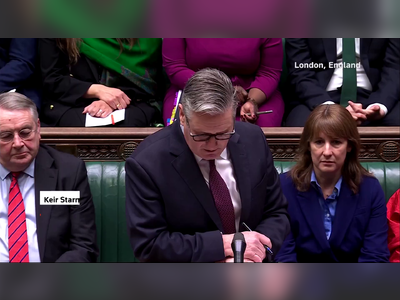Russia's Fossil Fuel Revenues Approach €900 Billion Since Ukraine Invasion
Despite sanctions, European nations continue to import Russian energy, contributing significantly to Moscow's earnings
Since the onset of its full-scale invasion of Ukraine in February 2022, Russia has accrued approximately €887 billion from fossil fuel exports, according to data compiled by the Centre for Research on Energy and Clean Air (CREA).
Notably, €228 billion of this revenue originated from countries that have imposed sanctions on Moscow, with European Union member states accounting for €209 billion of the total.
In 2024, Russia's fossil fuel export earnings amounted to nearly €254 billion, a slight decline from the previous year.
This decrease was attributed to a 5% drop in overall fossil fuel revenues and a 6% reduction in export volumes.
However, revenues from crude oil exports increased by 6%, and pipeline gas exports rose by 9% compared to 2023.
The European Union's imports of Russian fossil fuels in 2024 totaled €21.9 billion, surpassing the €18.7 billion in financial aid provided to Ukraine during the same period.
Despite a significant reduction in Russian gas imports—from 45% of the EU's total gas imports in 2021 to 19% in 2024—liquefied natural gas (LNG) imports from Russia have surged by 60% over the past three years.
Russia now ranks as the EU's second-largest LNG supplier, following the United States.
A notable factor in the continued flow of Russian energy into Europe is the so-called "refining loophole." Countries like India and Turkey have increased their imports of discounted Russian crude oil, refining it into products such as diesel and gasoline, which are then exported to Europe.
In the first three quarters of 2024, India's fuel exports to the EU rose by 58%, with a significant portion derived from Russian crude.
Similarly, Turkey's fuel exports to the EU increased by 107% during the same period.
Pipeline gas exports from Russia to Europe have also persisted.
Although Ukraine ceased the transit of Russian gas through its territory in January 2025, the TurkStream pipeline, which transports gas from Russia through Turkey to Southeast Europe, has seen increased activity.
In the first quarter of 2025, TurkStream's gas deliveries to Europe rose by 16% year-on-year, with Hungary and Slovakia being primary recipients.
The European Union has set a target to eliminate Russian gas imports by the end of 2027 and plans to prohibit new contracts starting in 2025.
However, internal divisions among member states, particularly Hungary and Slovakia, pose challenges to achieving this goal.
The European Commission is also exploring legal avenues to allow companies to exit long-term gas contracts with Russia without incurring penalties, including invoking force majeure clauses.
Despite these efforts, the continued importation of Russian fossil fuels by European nations underscores the complexities involved in reducing dependence on Russian energy sources while maintaining energy security.
Notably, €228 billion of this revenue originated from countries that have imposed sanctions on Moscow, with European Union member states accounting for €209 billion of the total.
In 2024, Russia's fossil fuel export earnings amounted to nearly €254 billion, a slight decline from the previous year.
This decrease was attributed to a 5% drop in overall fossil fuel revenues and a 6% reduction in export volumes.
However, revenues from crude oil exports increased by 6%, and pipeline gas exports rose by 9% compared to 2023.
The European Union's imports of Russian fossil fuels in 2024 totaled €21.9 billion, surpassing the €18.7 billion in financial aid provided to Ukraine during the same period.
Despite a significant reduction in Russian gas imports—from 45% of the EU's total gas imports in 2021 to 19% in 2024—liquefied natural gas (LNG) imports from Russia have surged by 60% over the past three years.
Russia now ranks as the EU's second-largest LNG supplier, following the United States.
A notable factor in the continued flow of Russian energy into Europe is the so-called "refining loophole." Countries like India and Turkey have increased their imports of discounted Russian crude oil, refining it into products such as diesel and gasoline, which are then exported to Europe.
In the first three quarters of 2024, India's fuel exports to the EU rose by 58%, with a significant portion derived from Russian crude.
Similarly, Turkey's fuel exports to the EU increased by 107% during the same period.
Pipeline gas exports from Russia to Europe have also persisted.
Although Ukraine ceased the transit of Russian gas through its territory in January 2025, the TurkStream pipeline, which transports gas from Russia through Turkey to Southeast Europe, has seen increased activity.
In the first quarter of 2025, TurkStream's gas deliveries to Europe rose by 16% year-on-year, with Hungary and Slovakia being primary recipients.
The European Union has set a target to eliminate Russian gas imports by the end of 2027 and plans to prohibit new contracts starting in 2025.
However, internal divisions among member states, particularly Hungary and Slovakia, pose challenges to achieving this goal.
The European Commission is also exploring legal avenues to allow companies to exit long-term gas contracts with Russia without incurring penalties, including invoking force majeure clauses.
Despite these efforts, the continued importation of Russian fossil fuels by European nations underscores the complexities involved in reducing dependence on Russian energy sources while maintaining energy security.











